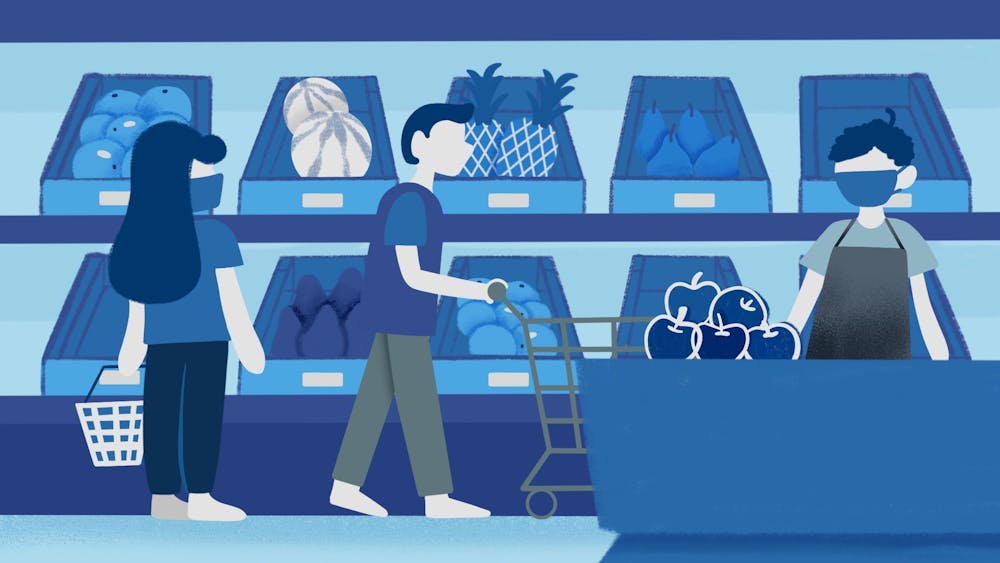In the spring, grocery stores were battlegrounds of pandemic compliance, sometimes literally.
There were countless videos of shoppers arguing and fighting over masks. Other videos showed people throwing tantrums after workers ask them to leave. Some showed employees guarding the front door like soldiers, doing their best to enforce mask mandates.
While coronavirus case counts around the country have risen, concerns about the virus have diminished in and out of the grocery aisles as the months pass.
For the last two months, I have been working in a grocery store, a local Safeway near my home after a summer of unemployment. At times, it seems many people have forgotten all about the pandemic.
I have seen hundreds of people walk through the store, and about every third person was wearing their mask incorrectly, and every eighth wasn’t wearing one at all. While I stock the shelves, people approach me with less than six feet of distance and pull their mask down so they can ask me where the milk is.
For those wearing their masks correctly, most explained they wear them because of local ordinances and then vocalized how they despise wearing them. In one instance, a customer had a custom surgical mask, featuring the Grinch next to the words, “I hate wearing this,” in the Dr. Seuss font.
So far, I have not been made the subject of any viral screaming matches, but customers have harassed me for stepping out of the employee mode and sharing my honest thoughts.
One man wearing an N95 mask approached me to ask when I thought “this whole mask thing” would be over. For a moment, I considered answering in my customer service voice, an octave higher than my usual, to say, “Soon, I hope,” and be done with it.
But instead, I said that even if everyone did the right thing by wearing masks and staying home, it would last a lot longer than we’d like.
The man then unmasked himself — figuratively and literally — to begin berating me, saying his “sources” said that was not the case. I recommended he get new sources and provided some, which only made him angrier. I tried to defuse the situation with a joke about people wearing space helmets as masks but to no avail.
He walked closer and closer to me so he could touch me on the shoulder, then mock me by pulling his hand back, saying he “might have the virus on it.” I could only walk away as he cackled.
Outside the store's front door, there is a sign reminding customers that masks are required inside. There are one-way stickers for each aisle, and reminders for mask-wearing and social distancing play over the in-store radio.
However, these are only recommendations and do not have to be followed. As employees, we are not required, or even asked, to enforce any policies, and we are expected to treat unmasked customers the same as those with masks.
The most employees can do is play a reminder over the intercom to all customers in the store, but if they have already entered without a mask and without any intention to get one, they will not upend their shopping to find a mask.
To ensure that no employees come to work sick, supervisors ask workers to check-in if they have any symptoms, similar to ASU's daily health checks. But, there are no temperature checks or store-provided tests.
In essence, it is an honor system.
To protect employees, the store removed tables from the break room and separated seats to promote social distancing and shut off the communal fridge to limit high-touch points.
These efforts have been undercut or ignored in recent weeks, as tables have returned and management brought in 20 boxes of pizza and wings for Labor Day, inviting employees to the cramped break room to grab a slice straight from the communal boxes, without any precautions whatsoever.
Throughout the day, the in-store radio station plays two messages of thanks on loop, one from Duracell thanking employees for their “tireless efforts” and another from Gov. Doug Ducey sharing his support for Arizona’s essential workers.
While it is nice to be acknowledged, these six-month-old messages sound insincere compared to the lack and loss of support for essential workers throughout the pandemic.
For example, coworkers have mentioned a hazard pay all employees received at the beginning of the pandemic, an extra two dollars that have long since disappeared. That raise, sometimes referred to as “hero pay,” has disappeared across the country.
According to United Food and Commercial Workers International, at least 82 grocery workers had died due to the coronavirus and 11,507 had been infected as of June 26.
In Maricopa County alone, daily confirmed cases of COVID-19 reached 3,867 on June 29, staying above 1,000 cases per day until July 19.
As this pandemic drags on, grocery stores remain one of the few businesses that must stay open. For many workers, these stores are their only option for employment at this moment, but it becomes difficult to justify risking your life for $12 an hour.
Reach the reporter at rknappen@asu.edu and follow @RyanKnappenber3 on Twitter.
Like The State Press on Facebook and follow @statepress on Twitter.




